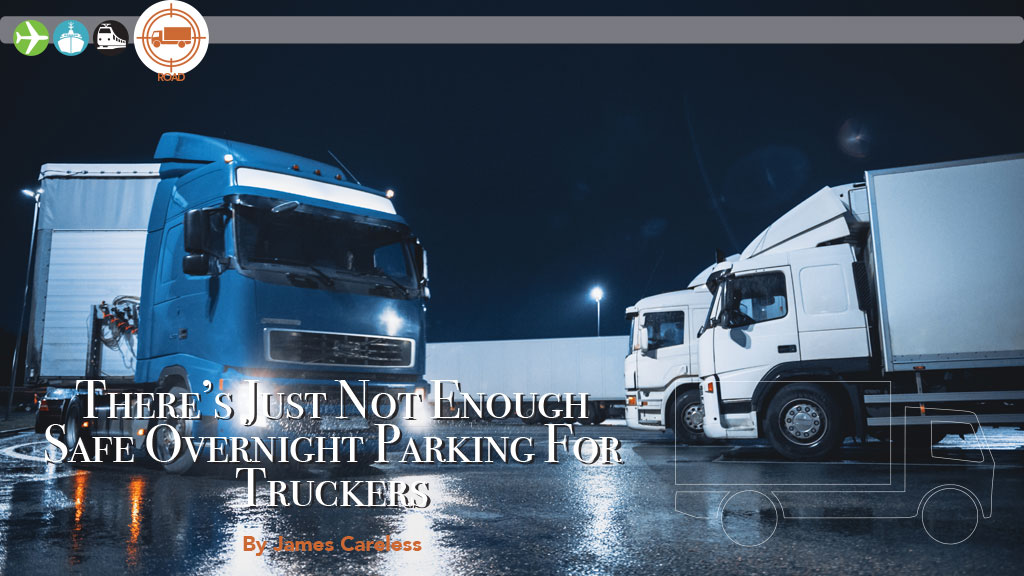There are millions of transport trucks on the road today, hauling the goods that keep society running. But there are not enough secure overnight parking spots available to allow drivers and their cargo to park safely. And so, in many cases, they park wherever they can to get some necessary sleep, even though many of the truckers’ improvised and unprotected resting locations put them at risk of accidents, theft and assault.
“In the United States, there is a shortage of safe overnight parking spots, whether provided by public agencies or private companies,” said Rebecca Brewster, president and COO of the American Transportation Research Institute. “So if you’re traveling along a U.S. interstate highway early in the morning, you’ll see trucks parked on the shoulder. This is obviously unsafe for the professional truck driver who’s forced to take their rest there. It’s unsafe for cars that have to navigate around those parked trucks. And the shoulders of our roadways were not designed to support large commercial vehicles over extended periods of time, so it’s bad for them too.”

Bosch Secure Truck Parking
The U.S. is not alone in having too few safe parking spots for truckers. “We regard this as a major problem in the European logistics sector as well,” said Jan-Philipp Weers, head of Bosch Secure Truck Parking. “According to a recent EU study, Europe suffers from a shortage of some 400,000 secure parking spaces for trucks. Truckers often search in vain through multiple parking lots for vacancies, or end up parking right next to the highway in unsafe, unsecured spaces.”
The Impact of Insufficient Parking
Not being able to find a safe place to park overnight weighs on the world’s truckers. “Every year the American Transportation Research Institute conducts a survey of drivers and carriers who are asked to list their top 10 concerns,” said Ellen Voie, president and CEO of Women In Trucking. “Truck parking has been listed in the Top Ten for over ten years. This year, it tied for first — with compensation — in the responses from professional drivers, which proves it is a continuous issue which doesn’t seem to be resolved.”

Women In Trucking
So how did we get here? Simply put, the shipping industry has avoided its responsibility to match the growing number of trucks on the road with a growing number of safe parking spots. Government will only provide them if there is enough pressure on politicians to fund such spots and to take trucker safety seriously.
Private parking operators will only provide safe parking if it is profitable. This can be the case in urban areas where the economics of scale make large secure parking lots economically viable. But along the sparsely populated highways that connect these cities? There’s just not enough money to be made from setting up small secure parking lots.
The impact of this situation on truckers causes many problems. Not being able to find safe overnight parking can result in driver fatigue, on-the-job stress and accidents caused by exhaustion. It can also lead to serious physical injuries or even death, if drivers are victimized by thieves when parked in unsafe areas.
Based on driver surveys, this is a very real danger. “We have conducted numerous surveys with female drivers to ask them where they feel their safety is compromised, and the overwhelming response is at truck stops and rest areas,” said Voie. This risk is heightened for female truckers whenever they have to park overnight in unsecured areas, especially if these locations are remote, improperly lit, and not patrolled.
Although it is difficult to determine the financial costs of driver fatigue, stress, injuries and death, the impact of theft is easy to calculate. “The financial loss due to freight theft alone is estimated at 8.2 billion euros across the European Union per year,” said Weers. “Now 75% of cargo theft takes place in unsecured parking lots. Thieves usually take advantage of the situation at night, when the truck is parked unprotected and the driver is asleep.” Consumer goods and car parts are among the most commonly stolen goods, as are jewelry, precious metals and food products.
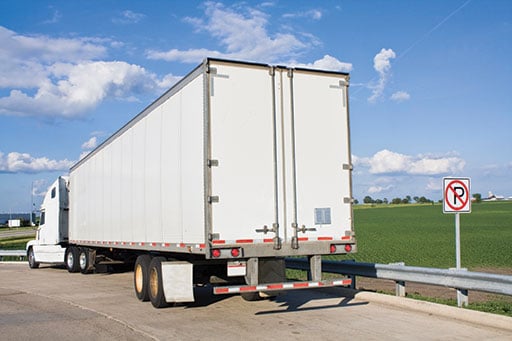
The last thing truckers want to experience is injury to themselves and/or others, plus the loss of their cargo. This is why the search for safe overnight parking has become a daily obsession for long-haul truckers — one that is cutting into their own productivity and the productivity of their employers and customers. The reason? “Truckers are losing an hour of drive time every day, in many cases, by choosing to pull off the road early to be sure to find a safe place to park,” Brewster said. That’s one hour less spent moving goods each day, affecting delivery schedules and supply chains at a time when the world is still reeling from COVID-induced shipping delays.
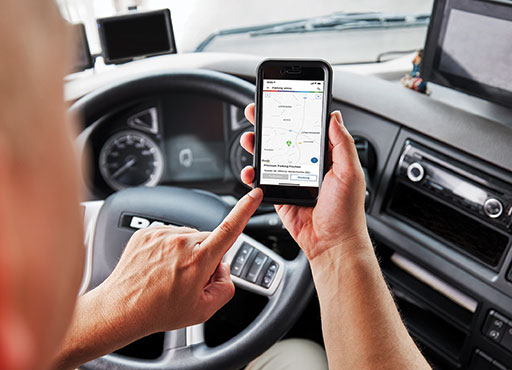
The hunt for safe overnight parking is being exacerbated by onboard electronic logging devices that record truckers’ hours, Voie added. “They start to look for an available spot before they run out of on-duty time,” she said. “Another reason for this situation is that many shippers and receivers do not want drivers parking on their property overnight, which also moves drivers to park in areas that might be less safe.”
Safe Parking Solutions
Clearly something needs to be done to make overnight parking safer for truckers. In Europe, Bosch is doing something about it through Bosch Secure Truck Parking.
“Bosch Secure Truck Parking provides technology-based security and service solutions for the logistics sector,” said Weers. “The focus is on our digital booking platform for truck parking spaces, which allows freight forwarders and drivers to book and pay for parking spaces online before they need them. Haulage managers and their drivers can view what parking spaces are available in real time and book what they need. This makes it easier to plan routes and rest periods, and helps truckers comply with their mandatory driving times and rest periods.”
As for providing enough spots for truckers in the tight European market? “The basic principle of Bosch Secure Truck Parking is as simple as it is plainly obvious,” Weers replied. “Just as with car sharing, logistics providers can help one another by sharing parking spaces.”
Assuming that this does happen, Bosch Secure Truck Parking is a positive response to the continent’s shortage of safe overnight parking spots for truckers. But the benefits don’t end there. “Firstly, reducing the traffic caused by drivers looking for parking spaces lowers fuel consumption and prevents drivers from exceeding their permitted driving time,” said Weers. “Secondly, it contributes to sustainability because less searching for parking reduces CO2 emissions and the overall carbon footprint. And there are further benefits: Urgently needed parking capacity for the logistics industry is created without having to pave over more land, while parking lot owners earn additional revenue from expanded usage of their facility.”
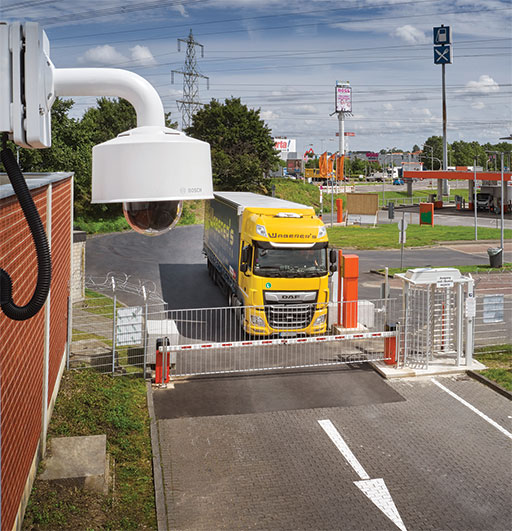
One last bonus: Bosch Secure Truck Parking users pay for these services through monthly all-in-one invoices, rather than individual charges. “This not only saves time and effort necessary to process countless billing documents, but also offers complete and transparent cost controlling, as all parking transactions and their associated costs are accessible online in real time,” Weers said. “Trucking companies have the neatly itemized parking fees overview at their disposal.”
“Ultimately, it is the truckers on the road who benefit most from this solution, because knowing their exact pre-booked parking spot lets them arrive at their overnight destination stress-free,” he said. “Secure parking lots equipped with facilities you can review in advance make day-to-day haulage routines significantly more convenient, comfortable, and secure — which, among other benefits, also improves sleep quality for drivers. These are all factors that positively impact road safety and are benefits that freight carriers can use to attract qualified haulage personnel and thus improve their positioning in a very competitive market.”
Also in Europe, the EU is currently creating a series of standards to regulate Safe and Secure Truck Parking Areas (SSTPAs) on the continent. Currently in the draft stage, these regulations will define the physical infrastructure, technology and procedures to be implemented at SSTPAs. They will also define service provision to truckers in areas such as personal hygiene, communications, food service, safety and multilingual information, among others.
“The SSTPA process is supported by industry stakeholders,” said Marco Digioia, secretary general of the European Road Haulers Association. “It will address a number of aspects such as making services available to drivers — showers, toilets, and accommodations — to detailed specifications for perimeter CCTV surveillance, security plans and risk prevention audits. These audits will determine the level of SSTPA standard that specific parking facilities will have to comply with.”
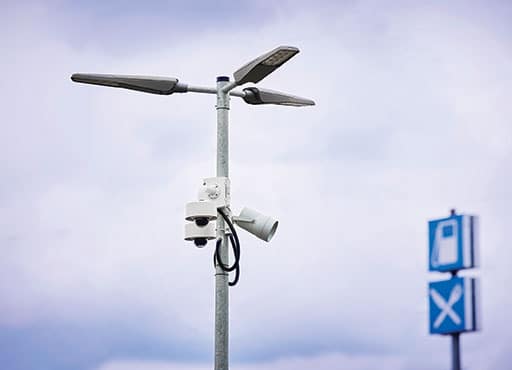
For his part, Weers thinks Europe’s shortage of safe parking spaces could be solved through legislation.
“The problem could be solved quickly if parking would be organized in a different way. In the EU there is a toll system, which means lorries pay high fees to be able to use motorways or state roads, and the public parking areas on them,” he said. “However, there are simply not enough of these public parking areas, which means lorry drivers often resort to using private parking lots. As a result, transport companies end up paying for parking twice — within the toll scheme and as part of the fees demanded by the operator of the private parking lot.”
Faced with this financial double bind, transport companies do their best to avoid paying for private parking, which in turn discourages entrepreneurs from building new secured lots. “A regulatory change could fix the problem at its core,” Weers said, “by allowing transport companies to deduct the cost of private parking fees from the amounts they are charged for roadway tolls.”
“In this context, we welcome the new funding guideline from the Federal Ministry of Transport and Digital Infrastructure (BMVI) in Germany, which came into force last year,” he added. “The funding program offers companies financial incentives to provide truck parking spaces at truck stops and depots. This fits well with the sharing-economy principle of Bosch Secure Truck Parking and signals that the German ministry is willing to promote private initiative to solve the truck parking challenge.”
That’s not the case in the United States. There is not the same political will in either Washington or the 50 states to solve the parking shortage through legislation and direct public construction programs. As a result, safe parking solutions will have to come from the private sector, said Voie, possibly aided by government financial incentives and tax breaks.
“We have to make it economically advantageous for companies to offer parking for our tractor trailers and other large vehicles,” Voie said. “The truck stop industry claims to offer the solution, but drivers disagree that there is enough room in many of the corridors, especially in the northeastern part of the country. Still, there are so many wonderful private solutions that should be considered as well, such as www.truckpark.com (another online parking reservation system for truckers).”
She added that the government could make a difference by being creative in regard to parking regulations. This could include legislating the right for truckers to use parking lots during business off-hours, such as lots belonging to shopping malls, entertainment venues, sporting stadiums, and competitors’ carrier terminals. “Perhaps legislation to require warehouses to provide truck parking and facilities could make a difference,” Voie said.
In the meantime, truckers will have to improve their trip planning skills to find safe parking spots on their own.
“There are a number of smartphone apps that help drivers identify in real time where there’s available truck parking,” said Brewster. “Of course, a driver can’t access that data when they’re driving. They have to stop to legally look at their phone to find where that parking is available. But a number of state departments of transportation are also using changeable message signs along the interstate to notify drivers of how many available truck parking spaces are available at the next exit, which is obviously a time saver for drivers. They don’t have to pull off to see if there’s available parking.”
One thing is certain: Without specific action by government and industry to address the growing shortage of safe overnight park spots for truckers, the stress, assaults, robberies and theft of cargo that they and their firms are experiencing will increase in lockstep with the growing number of trucks on the road. This problem won’t go away. It has to be fixed.
